Cambly Kids Courses
Cambly Kids Courses
Cambly Kids Courses
Our courses are leveled according to the Common European Framework of Reference or CEFR. CEFR is used internationally as a means to standardize language ability. The scale ranges from A1 for beginners to C-level for learners who have near-mastery of the language. At Cambly Kids, we offer courses ranging from A1 to C1.
Our courses are leveled according to the Common European Framework of Reference or CEFR. CEFR is used internationally as a means to standardize language ability. The scale ranges from A1 for beginners to C-level for learners who have near-mastery of the language. At Cambly Kids, we offer courses ranging from A1 to C1.
A1 CEFR
Phonics Course
This Cambly Kids course teaches students the basics in English phonics. Students go through each letter of the alphabet and learn essential skills such as sound/letter recognition and proper pronunciation. They will also receive extensive practice reading simple words and sentences.

Basic Phonics
Students learn basic letter recognition and the sounds each letter makes. At the same time, they learn new words that expand their vocabulary so they can talk about a variety of topics.

Basic Phonics
Students learn basic letter recognition and the sounds each letter makes. At the same time, they learn new words that expand their vocabulary so they can talk about a variety of topics.

Learn How To Use Cambly
As a foundational course for true beginners, students also learn how to use the Cambly Kids platform. They learn, step-by-step, how to use classroom features such as using the pen tool.

Learn How To Use Cambly
As a foundational course for true beginners, students also learn how to use the Cambly Kids platform. They learn, step-by-step, how to use classroom features such as using the pen tool.

Basic Phrases
In addition to learning the basics of English phonics, students also learn basic phrases so they can introduce themselves to new people.

Basic Phrases
In addition to learning the basics of English phonics, students also learn basic phrases so they can introduce themselves to new people.
By the end of Phonics Course, students will be able to:
1
Recognize the letters of the English alphabet.
2
Introduce themselves with simple phrases.
3
Read simple words and phrases.
4
Sound out new words.
5
Tell others their likes and dislikes.
6
Use and navigate the Cambly platform.
A1 CEFR
Phonics Course
This Cambly Kids course teaches students the basics in English phonics. Students go through each letter of the alphabet and learn essential skills such as sound/letter recognition and proper pronunciation. They will also receive extensive practice reading simple words and sentences.

Basic Phonics
Students learn basic letter recognition and the sounds each letter makes. At the same time, they learn new words that expand their vocabulary so they can talk about a variety of topics.

Basic Phonics
Students learn basic letter recognition and the sounds each letter makes. At the same time, they learn new words that expand their vocabulary so they can talk about a variety of topics.

Learn How To Use Cambly
As a foundational course for true beginners, students also learn how to use the Cambly Kids platform. They learn, step-by-step, how to use classroom features such as using the pen tool.

Learn How To Use Cambly
As a foundational course for true beginners, students also learn how to use the Cambly Kids platform. They learn, step-by-step, how to use classroom features such as using the pen tool.

Basic Phrases
In addition to learning the basics of English phonics, students also learn basic phrases so they can introduce themselves to new people.

Basic Phrases
In addition to learning the basics of English phonics, students also learn basic phrases so they can introduce themselves to new people.
By the end of Phonics Course, students will be able to:
1
Recognize the letters of the English alphabet.
2
Introduce themselves with simple phrases.
3
Read simple words and phrases.
4
Sound out new words.
5
Tell others their likes and dislikes.
6
Use and navigate the Cambly platform.
A1 CEFR
Beginning English 1
This introductory course is appropriate for students with little to no English language background. Here, students gain the language skills needed at the A1 CEFR level. Students learn English through fun interactive lessons that focus on basic language skills.
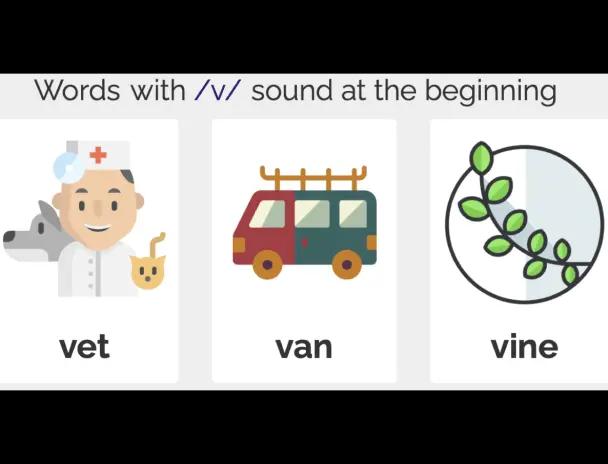
Foundational Language
Students learn basic letter recognition and the sounds each letter makes. At the same time, they learn new words that expand their vocabulary so they can talk about a variety of topics.

Foundational Language
Students learn basic letter recognition and the sounds each letter makes. At the same time, they learn new words that expand their vocabulary so they can talk about a variety of topics.
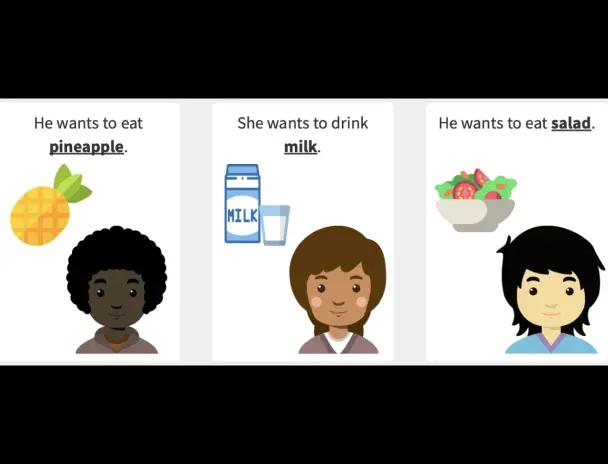
Basic Phrases
Along with letters, letter sounds, and basic vocabulary, students also learn useful phrases to talk about themselves and others, such as asking about people’s wants.

Basic Phrases
Along with letters, letter sounds, and basic vocabulary, students also learn useful phrases to talk about themselves and others, such as asking about people’s wants.
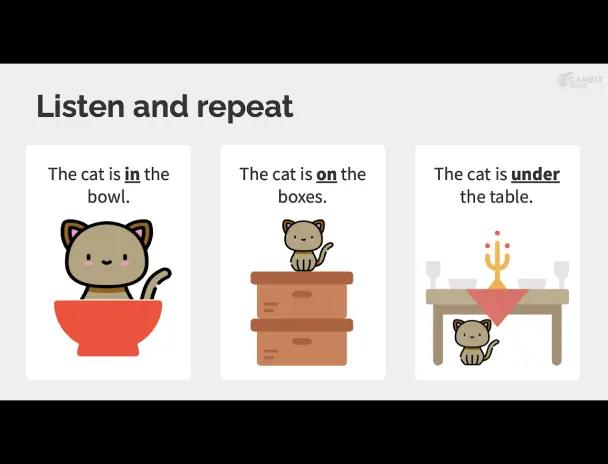
Basic Grammar
Our courses also teach grammar points such as possessives and prepositions that prepare students for more complex language.

Basic Grammar
Our courses also teach grammar points such as possessives and prepositions that prepare students for more complex language.
By the end of Beginning English 1, students will be able to:
1
Recognize the letters of the English alphabet.
2
Read short, simple words and sentences.
3
Recognize the names of common animals and other words related to clothes, hobbies, etc.
4
Understand simple sentences about the world around them.
5
Respond to personal questions on a variety of topics, such as their family.
6
Understand simple expressions of communication, such as “How are you?”
A1 CEFR
Beginning English 1
This introductory course is appropriate for students with little to no English language background. Here, students gain the language skills needed at the A1 CEFR level. Students learn English through fun interactive lessons that focus on basic language skills.

Foundational Language
Students learn basic letter recognition and the sounds each letter makes. At the same time, they learn new words that expand their vocabulary so they can talk about a variety of topics.

Foundational Language
Students learn basic letter recognition and the sounds each letter makes. At the same time, they learn new words that expand their vocabulary so they can talk about a variety of topics.

Basic Phrases
Along with letters, letter sounds, and basic vocabulary, students also learn useful phrases to talk about themselves and others, such as asking about people’s wants.

Basic Phrases
Along with letters, letter sounds, and basic vocabulary, students also learn useful phrases to talk about themselves and others, such as asking about people’s wants.

Basic Grammar
Our courses also teach grammar points such as possessives and prepositions that prepare students for more complex language.

Basic Grammar
Our courses also teach grammar points such as possessives and prepositions that prepare students for more complex language.
By the end of Beginning English 1, students will be able to:
1
Recognize the letters of the English alphabet.
2
Read short, simple words and sentences.
3
Recognize the names of common animals and other words related to clothes, hobbies, etc.
4
Understand simple sentences about the world around them.
5
Respond to personal questions on a variety of topics, such as their family.
6
Understand simple expressions of communication, such as “How are you?”
A1-A2 CEFR
Beginning English 2
Building off of the skills learned in the previous course, Beginning English 2 continues through A1-level vocabulary and grammar towards more complex language found at the A2-level. Follow siblings Ann and Peter as they travel around North America with their family!
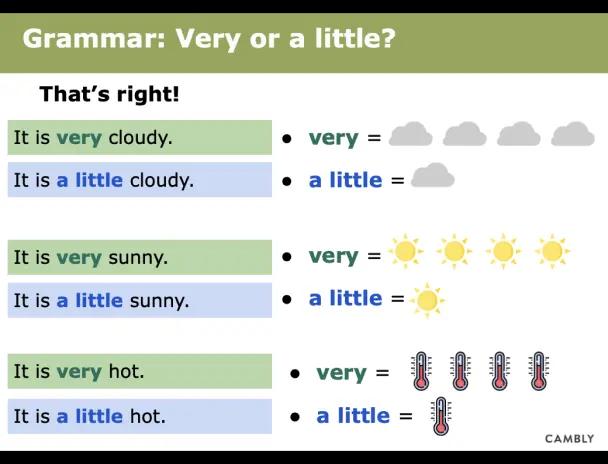
Adjectives and Adverbs
Students learn more words to describe the world around them, such as how to use adjectives and adverbs to talk about the weather.

Adjectives and Adverbs
Students learn more words to describe the world around them, such as how to use adjectives and adverbs to talk about the weather.
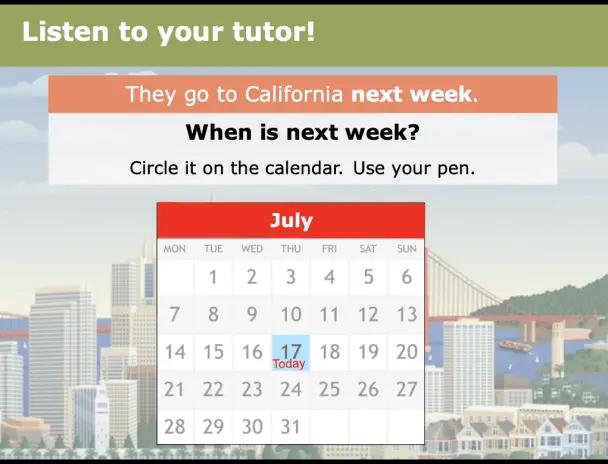
Everyday Phrases
Students also learn common phrases, such as time adverbials and learn new facts about various places in the United States and Canada.

Everyday Phrases
Students also learn common phrases, such as time adverbials and learn new facts about various places in the United States and Canada.
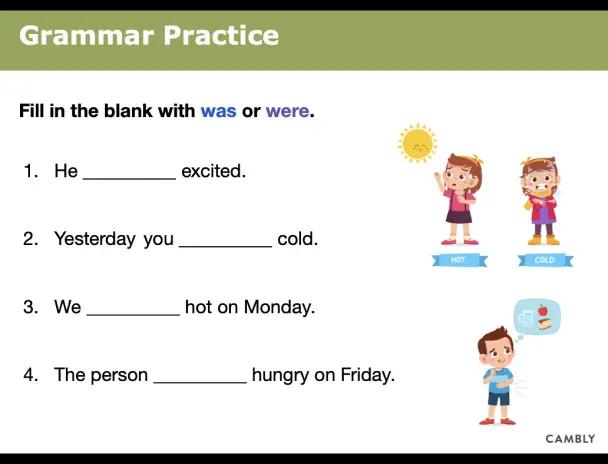
More Vocabulary and Grammar
This course also introduces students to a variety of new vocabulary and grammar, such as parts of the body and irregular past tense verbs.

More Vocabulary and Grammar
This course also introduces students to a variety of new vocabulary and grammar, such as parts of the body and irregular past tense verbs.
By the end of Beginning English 2, students will be able to:
1
Ask questions and use fixed expressions.
2
Understand when someone talks about their family and friends in simple sentences.
3
Ask someone about their hobbies and answer similar questions.
4
Read simple sentences and understand simple stories.
5
Have conversations about everyday topics.
6
Listen to and repeat words and phrases after their tutor, at the A1-A2-level.
A1-A2 CEFR
Beginning English 2
Building off of the skills learned in the previous course, Beginning English 2 continues through A1-level vocabulary and grammar towards more complex language found at the A2-level. Follow siblings Ann and Peter as they travel around North America with their family!

Adjectives and Adverbs
Students learn more words to describe the world around them, such as how to use adjectives and adverbs to talk about the weather.

Adjectives and Adverbs
Students learn more words to describe the world around them, such as how to use adjectives and adverbs to talk about the weather.

Everyday Phrases
Students also learn common phrases, such as time adverbials and learn new facts about various places in the United States and Canada.

Everyday Phrases
Students also learn common phrases, such as time adverbials and learn new facts about various places in the United States and Canada.

More Vocabulary and Grammar
This course also introduces students to a variety of new vocabulary and grammar, such as parts of the body and irregular past tense verbs.

More Vocabulary and Grammar
This course also introduces students to a variety of new vocabulary and grammar, such as parts of the body and irregular past tense verbs.
By the end of Beginning English 2, students will be able to:
1
Ask questions and use fixed expressions.
2
Understand when someone talks about their family and friends in simple sentences.
3
Ask someone about their hobbies and answer similar questions.
4
Read simple sentences and understand simple stories.
5
Have conversations about everyday topics.
6
Listen to and repeat words and phrases after their tutor, at the A1-A2-level.
A2
Beginning English 3
This course advances students’ knowledge and understanding of English to the A2-level. Follow our characters, Daisy and Emma, as they complete one school year in the UK. Their class also learns from Sammy, their pen pal, who travels the world. Daisy and Emma learn many things and visit many places. It’s a fun course that not only teaches students new vocabulary and grammar but also new cultural insights!
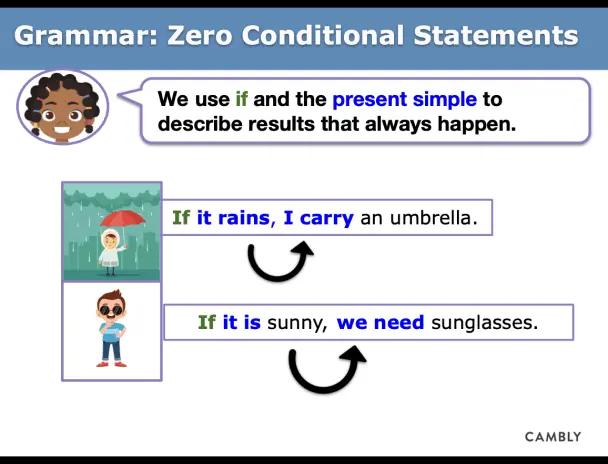
Complex Grammar
In this course, students learn more complex grammar, such as zero conditional statements.

Complex Grammar
In this course, students learn more complex grammar, such as zero conditional statements.
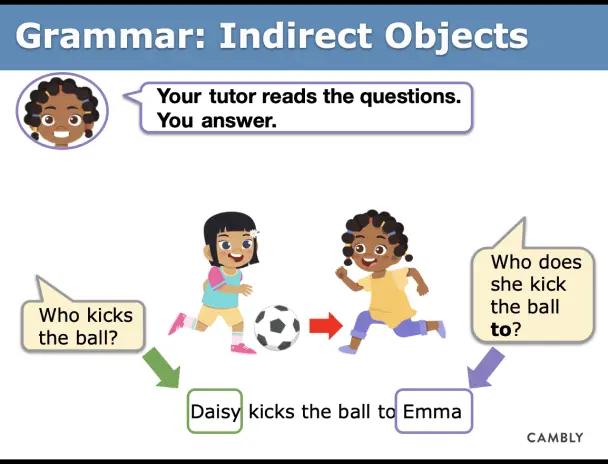
Indirect Objects
Students also encounter new grammar, such as the prepositions "to" and "for" when indirect objects are included in a sentence.

Indirect Objects
Students also encounter new grammar, such as the prepositions "to" and "for" when indirect objects are included in a sentence.
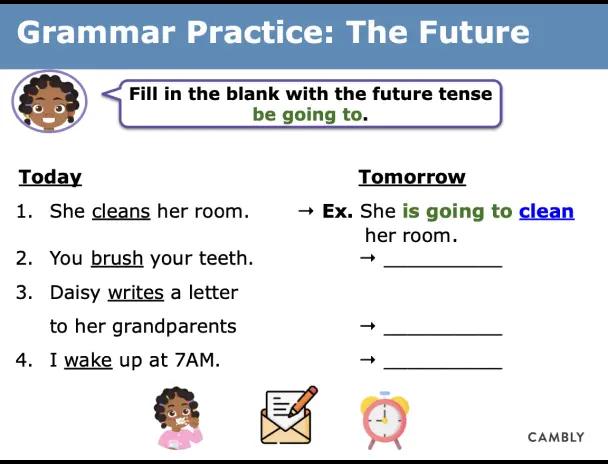
Built-in Review
To help students solidify their understanding of these new concepts, this course includes review lessons to gauge student learning.

Built-in Review
To help students solidify their understanding of these new concepts, this course includes review lessons to gauge student learning.
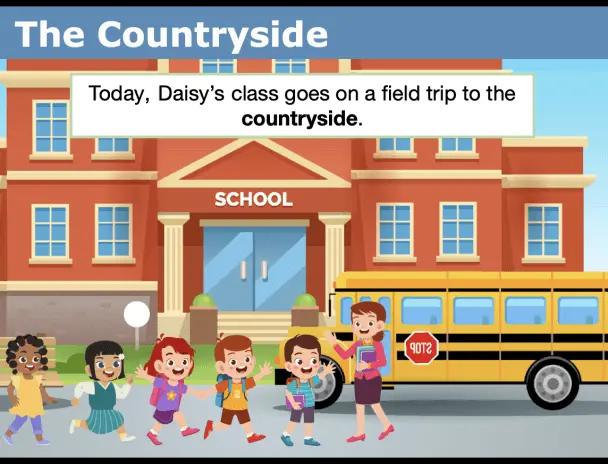
New Characters and Stories
Students continue their English language journey by engaging with fun stories. The lessons in this course follow stories that reinforce the newly learned vocabulary and grammar.

New Characters and Stories
Students continue their English language journey by engaging with fun stories. The lessons in this course follow stories that reinforce the newly learned vocabulary and grammar.
By the end of Beginning English 3, students will be able to:
1
Talk about problems using simple sentences.
2
Describe things they have done, such as what they did over the holidays.
3
Ask and answer questions about other people’s cultures and traditions.
4
Identify problems and discuss possible solutions.
5
Talk about future events.
6
Have more detailed discussions about everyday occurrences and activities.
A2
Beginning English 3
This course advances students’ knowledge and understanding of English to the A2-level. Follow our characters, Daisy and Emma, as they complete one school year in the UK. Their class also learns from Sammy, their pen pal, who travels the world. Daisy and Emma learn many things and visit many places. It’s a fun course that not only teaches students new vocabulary and grammar but also new cultural insights!

Complex Grammar
In this course, students learn more complex grammar, such as zero conditional statements.

Complex Grammar
In this course, students learn more complex grammar, such as zero conditional statements.

Indirect Objects
Students also encounter new grammar, such as the prepositions "to" and "for" when indirect objects are included in a sentence.

Indirect Objects
Students also encounter new grammar, such as the prepositions "to" and "for" when indirect objects are included in a sentence.

Built-in Review
To help students solidify their understanding of these new concepts, this course includes review lessons to gauge student learning.

Built-in Review
To help students solidify their understanding of these new concepts, this course includes review lessons to gauge student learning.

New Characters and Stories
Students continue their English language journey by engaging with fun stories. The lessons in this course follow stories that reinforce the newly learned vocabulary and grammar.

New Characters and Stories
Students continue their English language journey by engaging with fun stories. The lessons in this course follow stories that reinforce the newly learned vocabulary and grammar.
By the end of Beginning English 3, students will be able to:
1
Talk about problems using simple sentences.
2
Describe things they have done, such as what they did over the holidays.
3
Ask and answer questions about other people’s cultures and traditions.
4
Identify problems and discuss possible solutions.
5
Talk about future events.
6
Have more detailed discussions about everyday occurrences and activities.
A1-A2 CEFR
Introduction to English
This introductory course is appropriate for students aged 8 and above with little to no English language skills. Here, students gain the language skills needed at the A1-A2 CEFR level. Introduction to English encompasses the concepts learned in Beginning English 1, 2, and 3 but advances at a quicker pace, appropriate for older students. Students learn English through fun interactive lessons that focus on basic language skills.
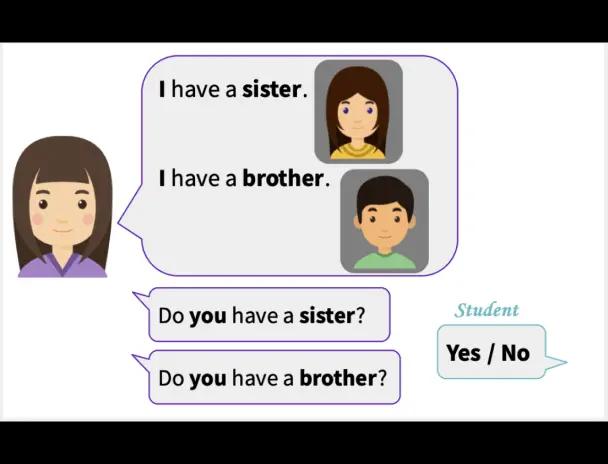
Basic Conversation
This course covers the concepts in the Beginning English series but at an accelerated pace. For example, students begin by learning terms related to family and personal pronouns simultaneously.

Basic Conversation
This course covers the concepts in the Beginning English series but at an accelerated pace. For example, students begin by learning terms related to family and personal pronouns simultaneously.
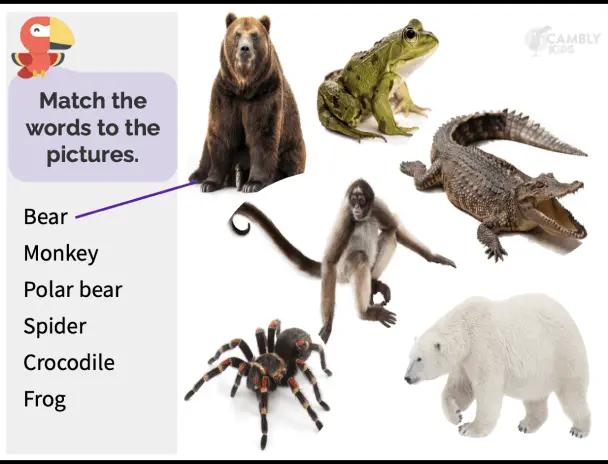
Basic Vocabulary
Throughout the course, students learn basic vocabulary related to animals, hobbies, clothes, school, and much more.

Basic Vocabulary
Throughout the course, students learn basic vocabulary related to animals, hobbies, clothes, school, and much more.
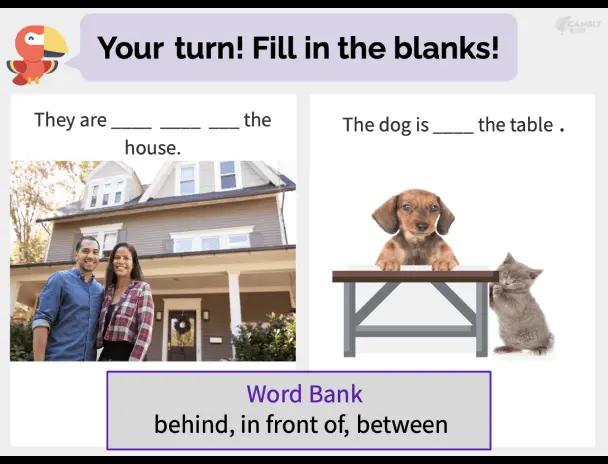
Basic Grammar
Students also cover grammar points that span the A1 and A2 CEFR levels. They learn concepts such as imperatives, adverbs of time, and prepositions of place.

Basic Grammar
Students also cover grammar points that span the A1 and A2 CEFR levels. They learn concepts such as imperatives, adverbs of time, and prepositions of place.
By the end of Introduction to English, students will be able to:
1
Read short, simple words and the names of some objects, such as animals and clothes.
2
Understand simple sentences about the world around them.
3
Understand when someone talks about their family and friends in simple sentences.
4
Ask someone about their hobbies and answer similar questions.
5
Understand and follow simple classroom instructions given by a teacher.
6
Talk briefly about things they have done, such as what they did on holiday.
A1-A2 CEFR
Introduction to English
This introductory course is appropriate for students aged 8 and above with little to no English language skills. Here, students gain the language skills needed at the A1-A2 CEFR level. Introduction to English encompasses the concepts learned in Beginning English 1, 2, and 3 but advances at a quicker pace, appropriate for older students. Students learn English through fun interactive lessons that focus on basic language skills.

Basic Conversation
This course covers the concepts in the Beginning English series but at an accelerated pace. For example, students begin by learning terms related to family and personal pronouns simultaneously.

Basic Conversation
This course covers the concepts in the Beginning English series but at an accelerated pace. For example, students begin by learning terms related to family and personal pronouns simultaneously.

Basic Vocabulary
Throughout the course, students learn basic vocabulary related to animals, hobbies, clothes, school, and much more.

Basic Vocabulary
Throughout the course, students learn basic vocabulary related to animals, hobbies, clothes, school, and much more.

Basic Grammar
Students also cover grammar points that span the A1 and A2 CEFR levels. They learn concepts such as imperatives, adverbs of time, and prepositions of place.

Basic Grammar
Students also cover grammar points that span the A1 and A2 CEFR levels. They learn concepts such as imperatives, adverbs of time, and prepositions of place.
By the end of Introduction to English, students will be able to:
1
Read short, simple words and the names of some objects, such as animals and clothes.
2
Understand simple sentences about the world around them.
3
Understand when someone talks about their family and friends in simple sentences.
4
Ask someone about their hobbies and answer similar questions.
5
Understand and follow simple classroom instructions given by a teacher.
6
Talk briefly about things they have done, such as what they did on holiday.
A2-B1 CEFR
Intermediate English 1
This course exposes students to more academic lessons, similar to content they would encounter in school. It focuses on improving students’ academic reading, speaking, and listening skills and invites students to take more initiative in the learning process. This course advances students’ language skills by solidifying their A1-A2 knowledge and introduces them to more B-level vocabulary and grammar concepts.
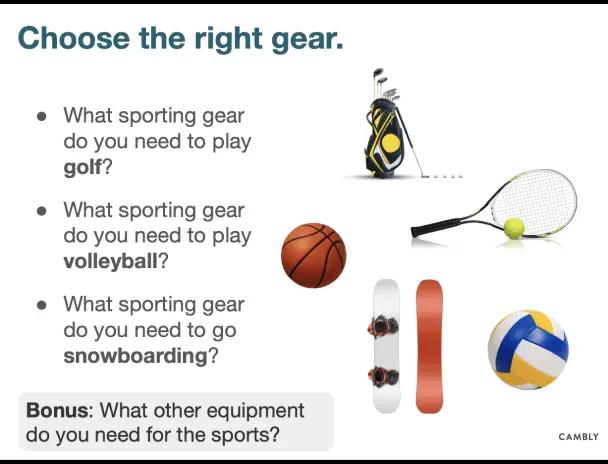
New Vocabulary
Students build on familiar concepts learned in the Beginning English series, such as family, clothing, and sports by learning more vocabulary associated with each.

New Vocabulary
Students build on familiar concepts learned in the Beginning English series, such as family, clothing, and sports by learning more vocabulary associated with each.
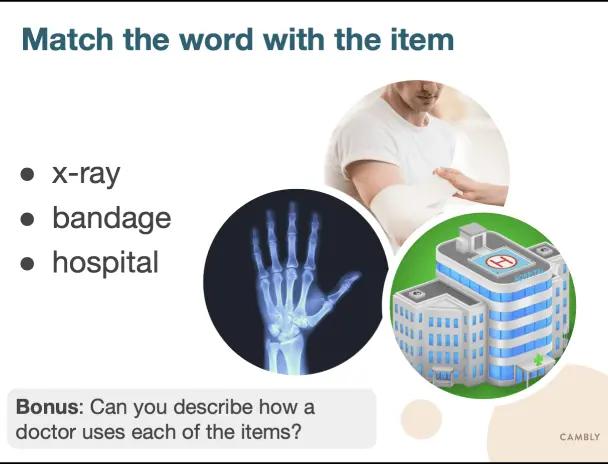
Academic Topics
They also learn new topics, such as geography, landforms, and medicine.

Academic Topics
They also learn new topics, such as geography, landforms, and medicine.
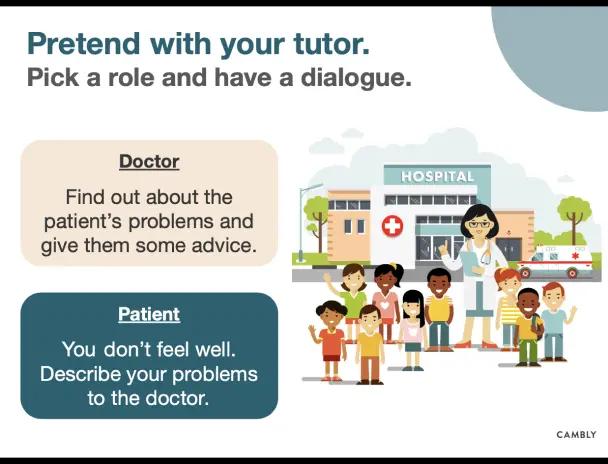
Interactive Activities
The lessons in this course depart from the Beginning series by including a wider variety of activities like role plays and spurring discussion by asking students their opinions.

Interactive Activities
The lessons in this course depart from the Beginning series by including a wider variety of activities like role plays and spurring discussion by asking students their opinions.
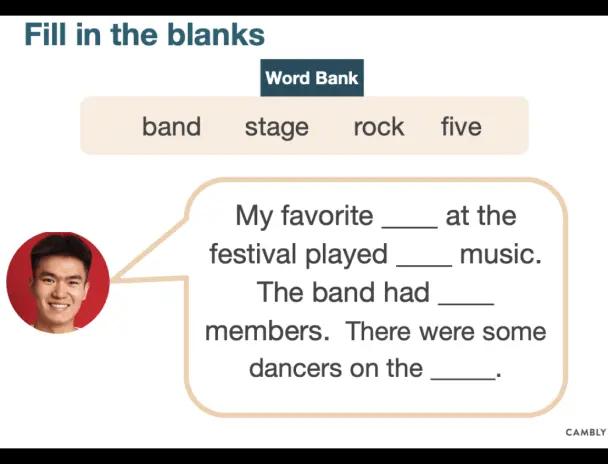
More Reading
The activities include more reading. For instance, the fill-in-the-blank activities require more advanced reading skills in order to complete a paragraph vs. a simple sentence.

More Reading
The activities include more reading. For instance, the fill-in-the-blank activities require more advanced reading skills in order to complete a paragraph vs. a simple sentence.
By the end of Intermediate English 1, students will be able to:
1
Use vocabulary to talk about a variety of topics, such as music festivals and geography.
2
Understand and use question words to respond and inquire about their surroundings.
3
Use the simple past and present tenses in a variety of contexts.
4
Use more verb types such as modals to talk about possibility.
5
Talk about hypothetical situations.
6
Complete more academic oriented activities.
A2-B1 CEFR
Intermediate English 1
This course exposes students to more academic lessons, similar to content they would encounter in school. It focuses on improving students’ academic reading, speaking, and listening skills and invites students to take more initiative in the learning process. This course advances students’ language skills by solidifying their A1-A2 knowledge and introduces them to more B-level vocabulary and grammar concepts.

New Vocabulary
Students build on familiar concepts learned in the Beginning English series, such as family, clothing, and sports by learning more vocabulary associated with each.

New Vocabulary
Students build on familiar concepts learned in the Beginning English series, such as family, clothing, and sports by learning more vocabulary associated with each.

Academic Topics
They also learn new topics, such as geography, landforms, and medicine.

Academic Topics
They also learn new topics, such as geography, landforms, and medicine.

Interactive Activities
The lessons in this course depart from the Beginning series by including a wider variety of activities like role plays and spurring discussion by asking students their opinions.

Interactive Activities
The lessons in this course depart from the Beginning series by including a wider variety of activities like role plays and spurring discussion by asking students their opinions.

More Reading
The activities include more reading. For instance, the fill-in-the-blank activities require more advanced reading skills in order to complete a paragraph vs. a simple sentence.

More Reading
The activities include more reading. For instance, the fill-in-the-blank activities require more advanced reading skills in order to complete a paragraph vs. a simple sentence.
By the end of Intermediate English 1, students will be able to:
1
Use vocabulary to talk about a variety of topics, such as music festivals and geography.
2
Understand and use question words to respond and inquire about their surroundings.
3
Use the simple past and present tenses in a variety of contexts.
4
Use more verb types such as modals to talk about possibility.
5
Talk about hypothetical situations.
6
Complete more academic oriented activities.
B1-B2 CEFR
Intermediate English 2
This course moves students firmly into the B1-B2 CEFR level and continues to incorporate more academic activities into each lesson. This course takes a different approach than previous courses. In Intermediate English 2, the lessons are divided into units of 4-5 lessons with each unit ending with a review and capstone lesson. Previous courses include review lessons. However, this course introduces students to more academically rigorous content by synthesizing the vocabulary and grammar they learn in each unit into a capstone lesson. These capstone lessons not only act as a unit review but also as a means to navigate more challenging reading, speaking, and listening activities they would encounter in an English-medium school.
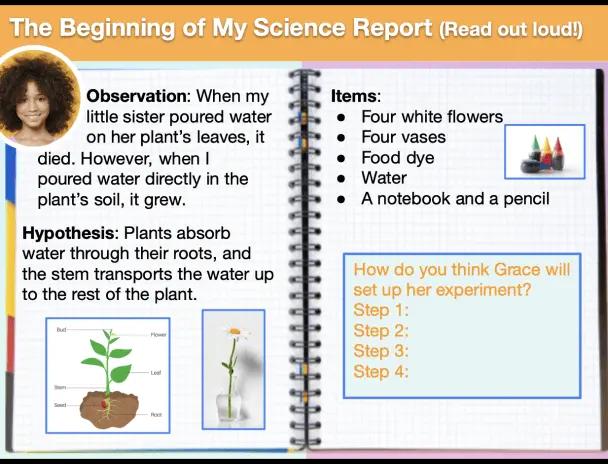
Academic Focus
In this course, students follow kids as they navigate through various activities and problems. For example, students follow a student as they write a science report.

Academic Focus
In this course, students follow kids as they navigate through various activities and problems. For example, students follow a student as they write a science report.
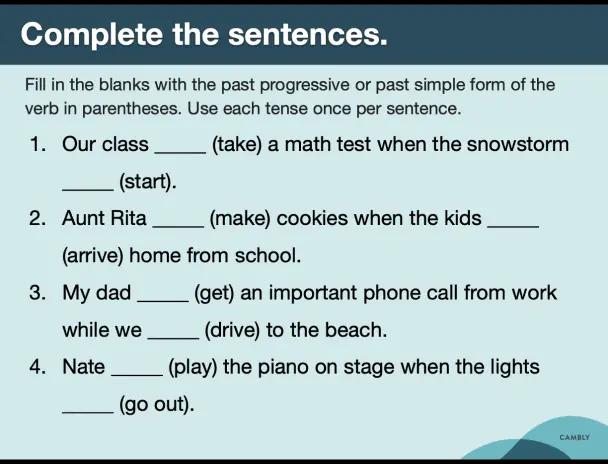
Advance Your English Skills
Students also learn more of the nuances of the English language, such as the difference between simple present and present progressive.

Advance Your English Skills
Students also learn more of the nuances of the English language, such as the difference between simple present and present progressive.
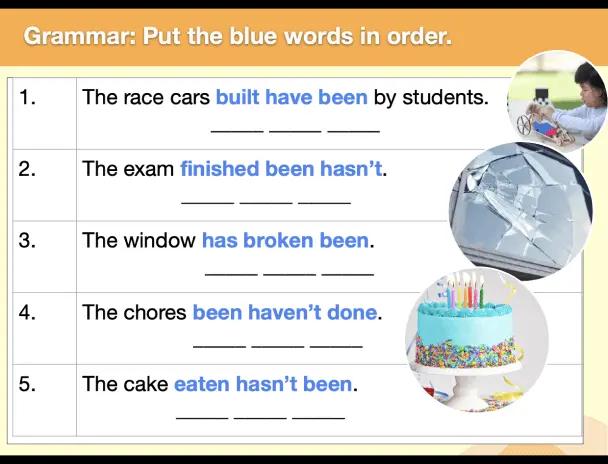
Challenging Activities
Students encounter more challenging activities to reinforce their understanding of these new concepts.

Challenging Activities
Students encounter more challenging activities to reinforce their understanding of these new concepts.
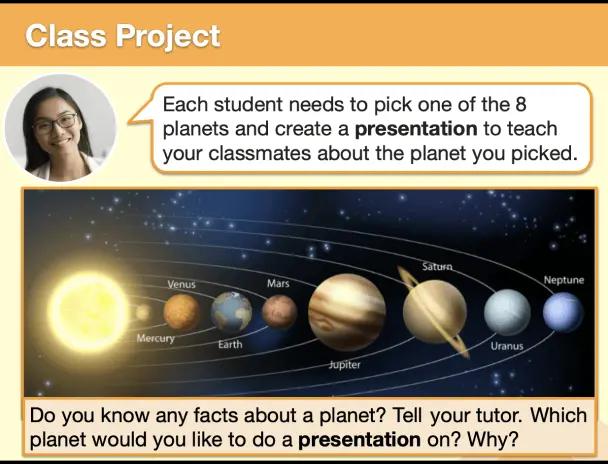
Advanced Academic Topics
This course prepares students for the Advanced English course series by giving them a solid foundation in B-level language skills and by exposing them to more academically challenging topics.

Advanced Academic Topics
This course prepares students for the Advanced English course series by giving them a solid foundation in B-level language skills and by exposing them to more academically challenging topics.
By the end of Intermediate English 2, students will be able to:
1
Ask questions about school activities, such as classroom assignments.
2
Understand instructions given by a teacher in the classroom.
3
Discuss solutions to various problems and be able to arrive at a solution.
4
Understand and use complex grammar, such as future perfect progressive.
5
Use new vocabulary to talk about a variety of academic subjects), such as history and literature.
6
Express their opinions on a variety of topics.
B1-B2 CEFR
Intermediate English 2
This course moves students firmly into the B1-B2 CEFR level and continues to incorporate more academic activities into each lesson. This course takes a different approach than previous courses. In Intermediate English 2, the lessons are divided into units of 4-5 lessons with each unit ending with a review and capstone lesson. Previous courses include review lessons. However, this course introduces students to more academically rigorous content by synthesizing the vocabulary and grammar they learn in each unit into a capstone lesson. These capstone lessons not only act as a unit review but also as a means to navigate more challenging reading, speaking, and listening activities they would encounter in an English-medium school.

Academic Focus
In this course, students follow kids as they navigate through various activities and problems. For example, students follow a student as they write a science report.

Academic Focus
In this course, students follow kids as they navigate through various activities and problems. For example, students follow a student as they write a science report.

Advance Your English Skills
Students also learn more of the nuances of the English language, such as the difference between simple present and present progressive.

Advance Your English Skills
Students also learn more of the nuances of the English language, such as the difference between simple present and present progressive.

Challenging Activities
Students encounter more challenging activities to reinforce their understanding of these new concepts.

Challenging Activities
Students encounter more challenging activities to reinforce their understanding of these new concepts.

Advanced Academic Topics
This course prepares students for the Advanced English course series by giving them a solid foundation in B-level language skills and by exposing them to more academically challenging topics.

Advanced Academic Topics
This course prepares students for the Advanced English course series by giving them a solid foundation in B-level language skills and by exposing them to more academically challenging topics.
By the end of Intermediate English 2, students will be able to:
1
Ask questions about school activities, such as classroom assignments.
2
Understand instructions given by a teacher in the classroom.
3
Discuss solutions to various problems and be able to arrive at a solution.
4
Understand and use complex grammar, such as future perfect progressive.
5
Use new vocabulary to talk about a variety of academic subjects), such as history and literature.
6
Express their opinions on a variety of topics.
B2-C1 CEFR
Advanced English 1
This course continues with more academically focused lessons. Advanced English 1 takes students on a journey through history as they discover ancient civilizations, as well as a trip through modern American cities. Lessons use these contexts to teach students new vocabulary and grammar that propels them further through B-level language skills.
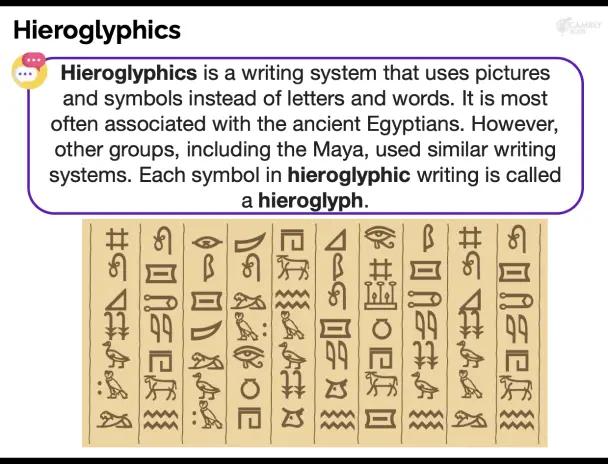
Ancient Civilizations
Students learn about ancient civilizations from the Aztec to Egypt. Students learn new vocabulary and grammar that will help them understand and talk about these new topics.

Ancient Civilizations
Students learn about ancient civilizations from the Aztec to Egypt. Students learn new vocabulary and grammar that will help them understand and talk about these new topics.
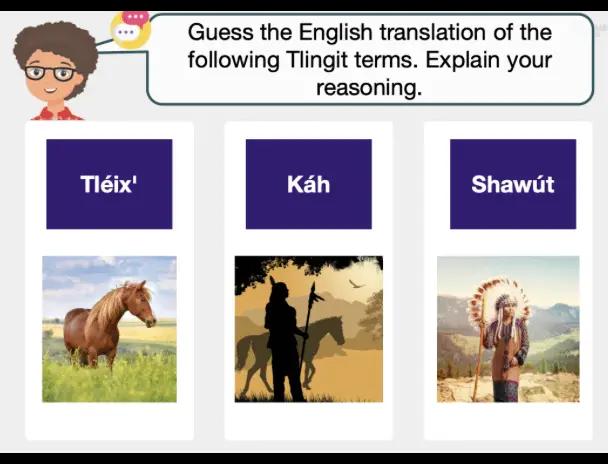
New Languages
The activities in this course give students the opportunity to learn new words not only in English but other languages as well!

New Languages
The activities in this course give students the opportunity to learn new words not only in English but other languages as well!
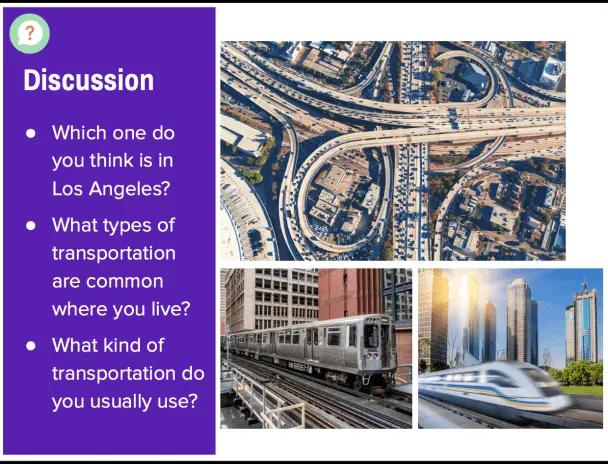
U.S. Cities
Students also learn about famous cities in the United States. These lessons give students the opportunity to learn more vocabulary in context with activities that challenge students to create their own narratives.

U.S. Cities
Students also learn about famous cities in the United States. These lessons give students the opportunity to learn more vocabulary in context with activities that challenge students to create their own narratives.
By the end of Advanced English 1, students will be able to:
1
Describe various aspects important to ancient civilizations, such as astronomy, agriculture, and language.
2
Relate ancient cultures and customs to the way of life we practice in the modern world.
3
Use new vocabulary to read and understand new information about American cities.
4
Identify important landmarks and distinguishing features of American cities.
5
Have academic discussions related to various topics.
6
Read academic texts that include complex grammar and new vocabulary.
B2-C1 CEFR
Advanced English 1
This course continues with more academically focused lessons. Advanced English 1 takes students on a journey through history as they discover ancient civilizations, as well as a trip through modern American cities. Lessons use these contexts to teach students new vocabulary and grammar that propels them further through B-level language skills.

Ancient Civilizations
Students learn about ancient civilizations from the Aztec to Egypt. Students learn new vocabulary and grammar that will help them understand and talk about these new topics.

Ancient Civilizations
Students learn about ancient civilizations from the Aztec to Egypt. Students learn new vocabulary and grammar that will help them understand and talk about these new topics.

New Languages
The activities in this course give students the opportunity to learn new words not only in English but other languages as well!

New Languages
The activities in this course give students the opportunity to learn new words not only in English but other languages as well!

U.S. Cities
Students also learn about famous cities in the United States. These lessons give students the opportunity to learn more vocabulary in context with activities that challenge students to create their own narratives.

U.S. Cities
Students also learn about famous cities in the United States. These lessons give students the opportunity to learn more vocabulary in context with activities that challenge students to create their own narratives.
By the end of Advanced English 1, students will be able to:
1
Describe various aspects important to ancient civilizations, such as astronomy, agriculture, and language.
2
Relate ancient cultures and customs to the way of life we practice in the modern world.
3
Use new vocabulary to read and understand new information about American cities.
4
Identify important landmarks and distinguishing features of American cities.
5
Have academic discussions related to various topics.
6
Read academic texts that include complex grammar and new vocabulary.
B2-C1 CEFR
Advanced English 2
The final course in the Cambly Kids core curriculum series gives students the opportunity to learn about the various biomes (i.e., the major habitats) found on Earth. These academic lessons are divided into units that each focus on a major biome, such as the tundra, rainforest, desert, and ocean. These courses reinforce the grammar points learned in previous courses while introducing students to new vocabulary needed to understand and discuss these new topics.

Earth's Biomes
Students learn about major biomes on planet Earth. Each unit's lessons focus on the weather, plants, animals, and the people who inhabit each of the major habitats.

Earth's Biomes
Students learn about major biomes on planet Earth. Each unit's lessons focus on the weather, plants, animals, and the people who inhabit each of the major habitats.
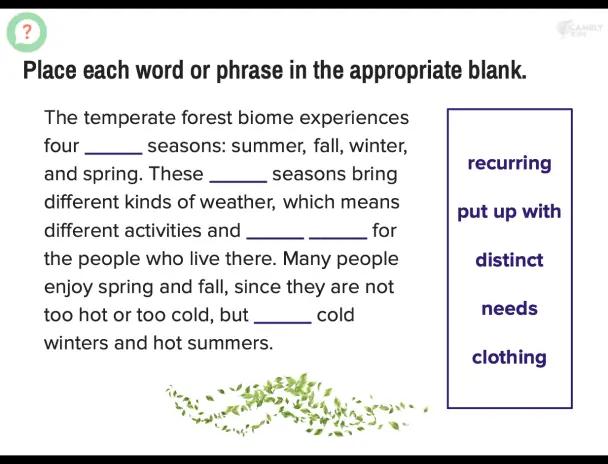
Academic Reading
Students learn more vocabulary that will aid them in reading. Activities such as fill-in-the-blank help students contextualize the words in academic reading passages.

Academic Reading
Students learn more vocabulary that will aid them in reading. Activities such as fill-in-the-blank help students contextualize the words in academic reading passages.
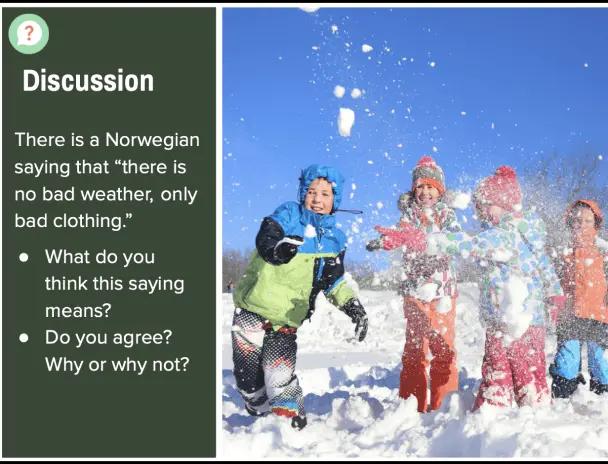
Engaging Questions
In Advanced English 2, discussion questions help engage students with the subject matter by tapping into their own opinions and experiences.

Engaging Questions
In Advanced English 2, discussion questions help engage students with the subject matter by tapping into their own opinions and experiences.
By the end of Advanced English 2, students will be able to:
1
Describe various aspects of the major biomes, such as the plants and animals found in each.
2
Relate their way of life with the lives of the people who live in each major habitat.
3
Use new vocabulary to read and understand new information about biomes.
4
Identify important distinguishing characteristics of each biome.
5
Have academic discussions about the various topics related to each major habitat.
6
Complete academic activities that they might encounter in school.
B2-C1 CEFR
Advanced English 2
The final course in the Cambly Kids core curriculum series gives students the opportunity to learn about the various biomes (i.e., the major habitats) found on Earth. These academic lessons are divided into units that each focus on a major biome, such as the tundra, rainforest, desert, and ocean. These courses reinforce the grammar points learned in previous courses while introducing students to new vocabulary needed to understand and discuss these new topics.

Earth's Biomes
Students learn about major biomes on planet Earth. Each unit's lessons focus on the weather, plants, animals, and the people who inhabit each of the major habitats.

Earth's Biomes
Students learn about major biomes on planet Earth. Each unit's lessons focus on the weather, plants, animals, and the people who inhabit each of the major habitats.

Academic Reading
Students learn more vocabulary that will aid them in reading. Activities such as fill-in-the-blank help students contextualize the words in academic reading passages.

Academic Reading
Students learn more vocabulary that will aid them in reading. Activities such as fill-in-the-blank help students contextualize the words in academic reading passages.

Engaging Questions
In Advanced English 2, discussion questions help engage students with the subject matter by tapping into their own opinions and experiences.

Engaging Questions
In Advanced English 2, discussion questions help engage students with the subject matter by tapping into their own opinions and experiences.
By the end of Advanced English 2, students will be able to:
1
Describe various aspects of the major biomes, such as the plants and animals found in each.
2
Relate their way of life with the lives of the people who live in each major habitat.
3
Use new vocabulary to read and understand new information about biomes.
4
Identify important distinguishing characteristics of each biome.
5
Have academic discussions about the various topics related to each major habitat.
6
Complete academic activities that they might encounter in school.
B2-C1 CEFR
Advanced Skills Practice
After students finish the core Cambly Kids curriculum, they will advance their language skills further with Advanced Skills Practice. This course is divided into units that offer additional reading and vocabulary practice on various topics. Students will learn about space exploration, food and culture, music, movies, and much more!
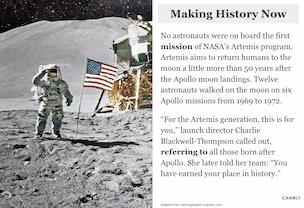
Space Exploration
Students learn about what it means to explore the solar system. Using the vocabulary and skills they learned in Intermediate English 2, students will read and learn about more advanced research topics.

Space Exploration
Students learn about what it means to explore the solar system. Using the vocabulary and skills they learned in Intermediate English 2, students will read and learn about more advanced research topics.

Food and Culture
In this course, students move from unit to unit covering a range of topics. Students will learn about food and how different cultures use it. They will learn about US holidays, such as Thanksgiving, and other traditions in other countries, like kimchi making in Korea.

Food and Culture
In this course, students move from unit to unit covering a range of topics. Students will learn about food and how different cultures use it. They will learn about US holidays, such as Thanksgiving, and other traditions in other countries, like kimchi making in Korea.

Bears
This course takes students' reading abilities to the next level by exposing them to more academic focused materials. They learn about scientists and how they do their jobs and conduct research.

Bears
This course takes students' reading abilities to the next level by exposing them to more academic focused materials. They learn about scientists and how they do their jobs and conduct research.
Advanced Skills Practice covers the following topics:
1
Space Exploration
2
Music and Movies
3
Food and Culture
4
The Art World
5
Animals and the Environment
6
All Things Sports
B2-C1 CEFR
Advanced Skills Practice
After students finish the core Cambly Kids curriculum, they will advance their language skills further with Advanced Skills Practice. This course is divided into units that offer additional reading and vocabulary practice on various topics. Students will learn about space exploration, food and culture, music, movies, and much more!

Space Exploration
Students learn about what it means to explore the solar system. Using the vocabulary and skills they learned in Intermediate English 2, students will read and learn about more advanced research topics.

Space Exploration
Students learn about what it means to explore the solar system. Using the vocabulary and skills they learned in Intermediate English 2, students will read and learn about more advanced research topics.

Food and Culture
In this course, students move from unit to unit covering a range of topics. Students will learn about food and how different cultures use it. They will learn about US holidays, such as Thanksgiving, and other traditions in other countries, like kimchi making in Korea.

Food and Culture
In this course, students move from unit to unit covering a range of topics. Students will learn about food and how different cultures use it. They will learn about US holidays, such as Thanksgiving, and other traditions in other countries, like kimchi making in Korea.

Bears
This course takes students' reading abilities to the next level by exposing them to more academic focused materials. They learn about scientists and how they do their jobs and conduct research.

Bears
This course takes students' reading abilities to the next level by exposing them to more academic focused materials. They learn about scientists and how they do their jobs and conduct research.
Advanced Skills Practice covers the following topics:
1
Space Exploration
2
Music and Movies
3
Food and Culture
4
The Art World
5
Animals and the Environment
6
All Things Sports